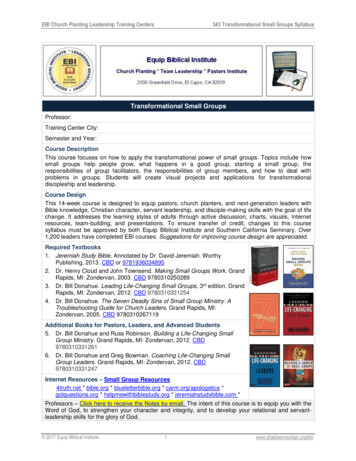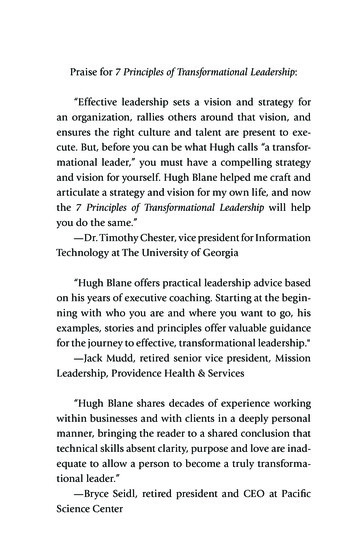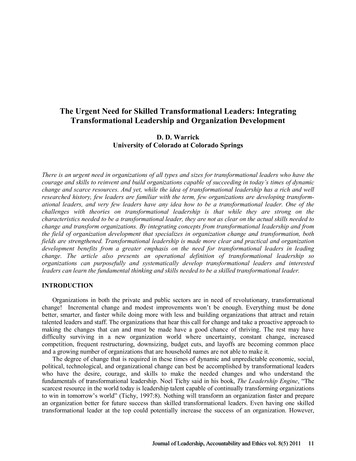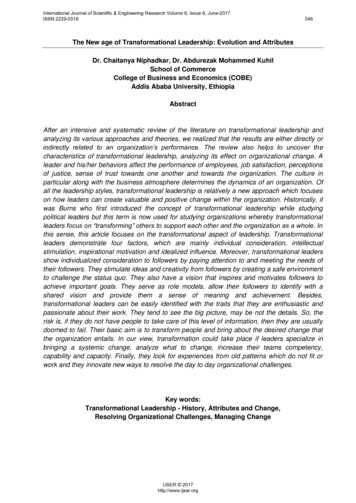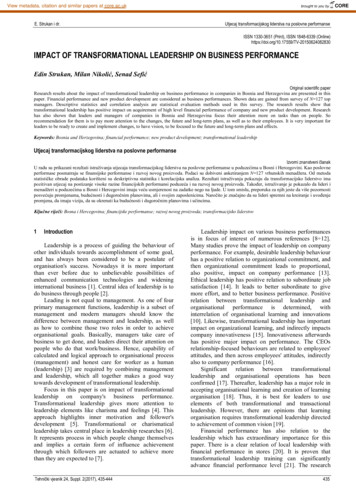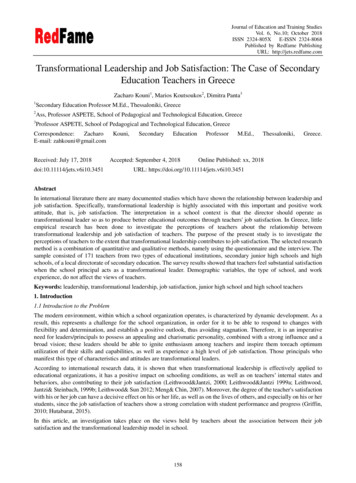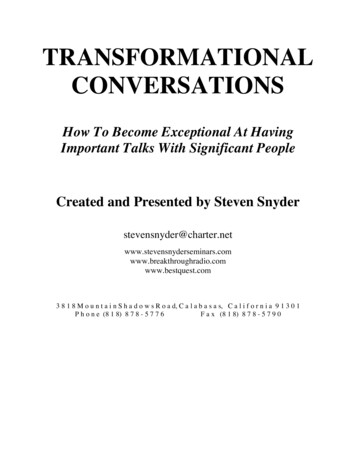
Transcription
TRANSFORMATIONALCONVERSATIONSHow To Become Exceptional At HavingImportant Talks With Significant PeopleCreated and Presented by Steven 3 8 1 8 M o u n t a i n S h a d o w s R o a d, C a l a b a s a s, C a l i f o r n i a 9 1 3 0 1P h o n e (8 1 8) 8 7 8 - 5 7 7 6F a x (8 1 8) 8 7 8 - 5 7 9 0
Transformational ConversationsHow To Become Exceptional At HavingImportant Talks With Significant PeopleCreated and Presented by Steven SnyderPeople engage in many levels of conversation. From having pleasant inconsequential small talk, to our mostimportant communications, with the most significant people in our lives. It is those consequential talks that makethe most difference that I call Transformational Conversations.Conversations such as:Talking with your spouse about the very best ways to parent.Talking with your partner about where the company could go.Talking with an employee about improving their performance.Talking with your kids about right and wrong, and yes and no.In this seminar we will utilize:The AlphaLearning Focused Passion Process to manage stress and set up states of peak performance.Neuro-Linguistic Programming Techniques to release negative patterns and create successful results.Listening and Reflective Communication Skills to develop rapport and insure mental and emotional clarity.Brain Mind / HeartMind Exercises for building confidence, developing interest, and enhancing empathy.We all have important conversations, executives probably more often than most. Working to maximize theoutcomes of these interactions, can be among our most rewarding investments. The vital exchanges that we havewith the people who matter the most, are the Olympic Events of our lives. They can be the crossroads, theturning points, that determine our future. In circumstances such as these, exceptional focus, clarity, empathy, andunderstanding are essential. Be sure that the next time you have one of these Transformational Conversations,you are prepared to be truly exceptional!!Value to the members: You will learn toFocus your attention and your passion, to make any chosen conversation, a truly peak performance.Tune in to your partner’s process and content, so that you are in harmony with their entire message.Guide your partner into quickly understanding your process, to promote even greater communication.Program your mind and heart, to both create, and to be prepared to receive, your desired outcomes.Have conversations in a state with instant access to creative genius, to handle anything unexpected.Walk proudly away from important conversations, feeling like you did your best, and gave it your all!Steven Snyder 3818 Mountain Shadows Road, Calabasas, CA 91301 818 878-5776 Fax 818 878-5790
Transformational ConversationsHow To Become Exceptional At HavingImportant Talks With Significant PeopleHiring Conversations(Meeting / Exploring / Interviewing / Auditioning)Information Conversations(Mentor / Learner / Questioning / Collaborating)Decision Conversations(Negotiating / Goal Setting / Reaching Conclusions)Empathy Conversations(Sharing Feelings / Emotions / Understanding)Solutions Conversations(Problem Solving / Logic / Creativity / Innovation)Commitment Conversations(Integrity / Values / Contracts / Agreements)Discipline Conversations(Expectations / Criticism / Ramifications)Empowerment Conversations(Enthusiasm / Inspiration / Motivation / Joy)Appreciation Conversations(Compliments / Compensation / Reward)Firing Conversations(Termination / Leaving / Ending / Retiring / Closure)
PREPARATION FOR EFFECTIVE COMMUNICATIONLet Go And Prepare To ListenAlpha Exercise – Close your eyes, take a deep breath and imagine your peaceful place. Takeabout a minute and with each inhale repeat to yourself, “I am relaxed” (or similar words), andwith each exhale repeat to yourself something like, “I am at peace”. Feel yourself letting go ofwhat you were doing and begin to unwind. Whenever you are ready, open your eyes.Focus Your BrainMind And HeartMind On Your Conversation PartnerAlpha Exercise – Close your eyes, take a deep breath and again imagine your peaceful place.Begin to think about the person with whom you are going to be speaking. Become aware of thethoughts and feeling that come up for you. Notice these thoughts and feelings with no judgementor attachment to any of them. Next, recall (or imagine) a positive experience that you haveshared with this person. Think of something about them that you appreciate. Whenever you areready, you can open your eyes.Focus Your BrainMind And HeartMind On The Upcoming ConversationAlpha Exercise – Close your eyes, take a deep breath and again imagine your peaceful place.Begin to think about your intention and your optimum outcome for the upcoming conversation.Imagine the process flowing very smoothly, with excellent communication.Take Responsibility For Conversational SuccessIt is easier to change the way you think about a person than it is to change the way a personthinks.Alpha Exercise – Close your eyes, take a deep breath and again imagine your peaceful place.Imagine coming to the end of the conversation with the realization that you stayed focused on theconversation the entire time and that your optimum outcome has been achieved
EFFECTIVE LISTENINGWomen like silent men, they think they are listening (Marcel Ackard)No one would listen to you talk, if they didn’t think their turn was next.Common Reasons For Not ListeningI want to talk first or I’m thinking of what I’m going to say.I’m not interested in the subject.I don’t like the person I’m talking to or I don’t like the way they speak.I’m concerned about other things.I don’t have time for this right now.I don’t want to hear what I think is coming.Active ListeningBegin with a positive attitude.Prevent emotions from sidetracking your reasoning.Keep checking on your level of concentration.Stay as patient as you can.Analyze what’s being said.Ask questions for clarification.Separate the relevant from the irrelevant.Test your understanding of what you hear.Consider the implications. Positive or negative consequences.Where does it fall on scale of true or false - good or bad adviseAnticipate but don’t prejudge where a particular line of thought is leading.Repeat the central points in your own words.Listen with your eyes (You can observe a lot just by watching - Yogi Berra)Listen with your intuition. Pay careful attention to your inner voice.
EFFECTIVE SPEAKINGDetermine your purpose and desired outcome.Create an outline either mental or written.Tell them what you are going to tell them, tell them, and then tell them what you told them.Clear negative emotions.When angry count to 10, when very angry count to 100 (Thomas Jefferson).Express yourself with emotion whenever appropriate.Add humor whenever appropriate.Get to the point quickly and continue to be concise.Always be truthful.Ask for what you want.Keep it as simple.Make it appropriate for the listener.Tune into the mood of the listener.Respect the other persons point of view.Watch your posture.Dress for the occasion.Explain abstract words and concepts.Vary your volume, inflection, and intonation.Use absolutes and generalities sparingly.Use gender neutral language.Illustrate with personal examples.Tell stories.
Preparing for ConversationsWith whom (or under what circumstances) am I likely to have one of these talks?Why are these talks important, and what benefits can I derive from doing it well?What are the possible consequences of doing it poorly?What expertise or strengths do I bring to these conversations?What are my weaknesses or areas of concern?What are my goals and what outcomes do I desire to create?What was one of the worst one of these talks I’ve ever had and why?What was one of the best of these talks I’ve ever had and why?Describe your ideal state of mind and heart that you’d like to feel during these conversations.Who do you know that is great at these conversations and why?
Hiring Conversations(Meeting / Exploring / Interviewing / Auditioning)Hire slowly, spend some extra time. It will serve you in the long run.Reveal something of yourself, it helps others to open up.Know what you are looking for ahead of time. Explore ethics and values.Start by being objective, without bias. There is room for subjectivity later.Look for the most striking traits and examine inconsistent traits very closely.Observe carefully, scan from head to toe (hair, watch, fingernails, shoes).Compassion for others and satisfaction with life are key indicatorsFocus on tone of voice, not just words and compare voice to body language
Information Conversations(Mentor / Learner / Questioning / Collaborating)Prepare for the conversation by focusing on the upcoming subject.Block out or handle any potential distractions.Get in touch with or create as much interest in the subject as you can.Work within your attention span. Take short breaks when necessary.Put strong emotion on what you most want to remember.Review thew most important points before finishing.Imagine a situation where you are remembering what you learned.Take notes or draw mind maps to help recall.
Decision Conversations(Negotiating / Goal Setting / Reaching Conclusions)Choose the right people to help you decide.Make your goals specific, measurable, achievable, right, and timely.Run scenarios on possible outcomesAvoid paralysis by analyses, wrong decisions might be better than no decisions.Know your ideal outcome(s) before beginning.Be sure that you have all the relevant information.Remain open to hearing every side before deciding.Be willing to compromise without being compromised.
Empathy Conversations(Sharing Feelings / Emotions / Understanding)Speak your truth without exaggerationListen with your heart more than your head.Let go of the need to be right.Be willing to listen without the need for solutions.Give feedback that you are both hearing and understanding.Put yourself as much as possible in the others shoes.Recall if you can when you were feeling the same way.Make eye contact and touch if appropriate.
Solutions Conversations(Problem Solving / Logic / Creativity / Innovation)Brainstorm and let every idea be a good one.Use deductive logic and eliminate what won’t work.Access the Alpha State to open up to the creativity of the HeartMind.Take alternative perceptions, see the problem from other points of view.Check your intuition to see what feels right.Look for more than one right answer.Run best case and worst case scenarios on each of the possible eering
Commitment Conversations(Integrity / Values / Contracts / Agreements)Be certain that the timing is right for all participants.Express the importance of the upcoming discussion.Handle all distractions ahead of time to be fully present.Create an environment that is free of interruptions.Be sure that all language is clear, concise and fully understood.Communicate your values and be consistent to them throughout.Review everything very carefully before making a commitment.Be certain that your head and heart are in agreement.
Discipline Conversations(Expectations / Criticism / Ramifications)Begin and end with appreciation and put the criticism in between.Be certain that all parties are very clear on all of the expectations.Express your optimism that things can be worked out.Describe whatever behavior or attitude that isn’t working.Express the way that you feel about it.Specify the attitude or behavior change that you desire.Share first the positive consequence that changing will bringIf the behavior persists then describe the negative consequences that not changing will bring.
Empowerment Conversations(Enthusiasm / Inspiration / Motivation / Joy)Express the way that you feel about the person’s potential.Let them know that you are aware of their accomplishments.Use enthusiasm and passion in your voice and mannerisms.Help them develop greater interest in achieving the desired outcome.Give them a sense of ownership in that outcome.Make them feel that they are an essential part of the team.
Appreciation Conversations(Compliments / Compensation / Reward)Create an environment that is free of distraction or interruptions.Introduce this conversation and allow the listener to prepare.Help the listener be comfortable and accepting of the praise.Be specific about exactly which attitudes or behaviors you appreciate.Share the importance of their contributions.Be sincere and not too effusive in the giving of compliments.Make sure to fit the reward to the person who is receiving it.Speak from the heart with emotion when praising.
Firing Conversations(Termination / Leaving / Ending / Retiring / Closure)Let them know up front what is happening.Create an environment that is free of distraction or interruptions.Be specific about the reasons for this decision.Share the process by which this conclusion was reached.Be firm but come from a place of gentle power.Be complimentary and appreciative whenever possible.Ask for questions and responses to ensure clarity.End the conversation on a positive note.
ENNEAGRAMOnes need to be perfect, they always compareTheir mandate is to do the right thingTo relax and accept and be wrong they must dareAnd find all the joy that can bringTwos are the givers, feel they must give to getIt is never enough to just beWith fear of disappointing, their needs don’t get metJust giving does not set them freeThrees are performers, they avoid what they feelThink efficiency assures their successTo grow they must know that their feelings are realWhen they welcome them they’re at their bestFours are romantics, they feel incompleteThey think ultimate love will fulfillBut they’re creative and passionate and really quite sweetWhile longing for the ultimate thrillFives are observers, their drive is to knowBut their world wants a lot, and gives lessWhile hoarding their privacy, in crisis they growThey need to prepare and not guessSixes are the questioners, always ready for the worstTo avoid or seek danger’s what they knowAlert and intuitive, to move ahead they put firstAccepting uncertainty’s how they growSevens are epicures, seeing pleasure not painReframing to the positive is their strengthNo frustration or boredom, there is too much to gainTo find happiness they will go to any lengthEights are the bosses, they strive to be strongKnowing that their way is rightThey must learn to moderate their force and be wrongAllowing softness they can find their delightNines are the mediators, always seeing all sidesBut they feel like they just don’t belongThey need more self importance where that feeling residesBeing accepting of change makes them strong
OneThe Perfectionist / The ReformerCan lead through integrity and reason, or be hindered by perfectionism and resentment.Challenge: Anger or ResentmentFear: Being bad, corrupt, evil, or defective.Desire: To have integrity (deteriorates into critical perfectionism).Principled, orderly, self righteous. Searching for perfection, avoiding mistakes.Earns love by being perfect, measuring up to highest standards. Need to be right.Severe internal critic, should, must, ought to. Underdeveloped relating skills.At Work:Likes guidelines, step by step procedures, schedules and accountability.Enjoys a job well done. Works hard for right cause or right leader. Afraid to be wrong.Shifts blame. Avoids risks.On a Team: Needs to be right. Thrives on controversy and debate, but hates to becontradicted.Finds the weak spots but prefers someone else to mention it first. Best in control of small area.Childhood Message: It’s not okay to make mistakes.Growth Opportunity:Examples:To live for a higher purpose.Plato, Mahatma Ghandi, George Harrison, Hillary Clinton,Jane Fonda, Ralph Nader
TwoThe Giver / The HelperCan shine with generosity and healing power, or struggle with people pleasing andpossessiveness.Challenge: Pride or EgoFear: Being unworthy of being loved.Desire: To be loved (deteriorates into need to be needed).Caring, generous, possessive, manipulative. Earns love by being helpful, must be all things forall people. Manages people’s lives, avoids own needs. Pride in being needed and important.Overexpressed feelings.At Work:The right hand person. The assistant with the secrets. The power behind thethrone. Highly responsive to approval and is crushed by disapproval. Plays favorites.On a Team: A team of equals presents a conflict between being liked and wanting specialattention. Needs an emotional connection. Project must be as important to others as it is tothem.Childhood Message: It’s not okay to have your own needs.Growth Opportunity:Examples:To nurture yourself and others.Mother Teresa, Eleanor Roosevelt, Ann Landers, Albert Schweitzer,Merv Griffin, John Denver
ThreeThe Performer / The AchieverCan become an inspiring example of excellence and authenticity, or blindly pursue success andstatus.Challenge: Deceit or VanityFear: Being worthless or of no inherent value.Desire: To be valuable (deteriorates into chasing after success).Adaptable, ambitious, image conscious, hostile. Earns love by achievement. Wants to lead andbe seen. Focus on family and on goals, tasks, results. I am what I do. Out of touch withfeelings.At Work:Wants to be efficient and save time. Willing to cut corners and ignore details.Avoids failure, switches tracks, finds a way that works. Needs respect more than being liked.On a Team: Tends to take over, push hard, work late, perhaps more for recognition than thesake of the project. Often impatient with others. Specialists not generalists, prefer to work intheir area of expertise.Childhood Message: It’s not okay have your own feelings and identity.Growth Opportunity:Examples:To develop yourself and set an example for others.Elvis Presley, Bill Clinton, Paul McCartney, Tom Cruise,Madonna, Oprah Winfrey
FourThe Romantic / The ArtistCan model creativity and intuitive power, or be held back by moodiness and self consciousness.Challenge: Envy, Emptiness Fear: Being without identity or personal significance.Desire: To be oneself (deteriorates into self indulgence).At Work:Needs creative job. Prefers emotional intensity. Efficiency tied to moodCan sabotage project over love affair. Has trouble working with those more skilled or betterpaid.On a Team: Prefers to see themselves as star rather than team member. Feels attacked whenideas are questioned. Needs recognition and to be heard. Does not always need to be right ifthey are being listened to. Intuitive, individualistic, self absorbed, depressive. Wants what ismissing or hard to get. Longing for love at a distance, life is flat, searching for drama. Ampingup life through fantasy. Supports others in pain or crisis. Underexpressed feelings.Childhood Message: It’s not okay to be too functional or too happy.Growth Opportunity:Examples:To let go of the past and be renewed by your experiences.Judy Garland, Jackie Onassis, Tennessee Williams, Bob Dylan,Edgar Allan Poe, James Dean
FiveThe Observer / The ThinkerCan demonstrate visionary intellect and inventiveness, or become increasingly eccentric andisolated.Challenge: Avarice or GreedFear: Being useless, incapable, or incompetent.Desire: To be competent (deteriorates into useless specialization).Perceptive, original, provocative, eccentric. Detached from strong emotions. Strong need forprivacy, more emotional when alone. Makes do with less. Values structure and emotionalcontrol. Underdeveloped doing skills.At Work:Need predictability. Avoids conflict. Resents having to work on other’s projects.Prefers privacy. Finds it hard to concentrate with others around. Prefers logical decisions.On a Team: Needs structure, hates open ended brainstorming. If distracted they find it hard torefocus. Once committed they are unstoppable. Appear isolated but are unaware of theirisolation.Childhood Message: It’s not okay to be comfortable in the world.Growth Opportunity:Examples:To observe yourself and others without judgement or expectations.Stephen King, Lily Tomlin, Vincent Van Gogh, Stephen Hawking,Bill Gates, Charles Darwin
SixThe Trooper / The LoyalistCan exemplify courage and commitment, or struggle with anxiety and rebelliousness.Challenge: Fear or AnxietyFear: Being without support or guidance.Desire: To be secure (deteriorates into an attachment to beliefs).Engaging, responsible, defensive, paranoid. Afraid to trust and be betrayed, loyal in love, needsreassurance. Procrastination, avoiding action, high goals, low completion. Afraid of success.Out of touch with doing.At Work:Very analytical. Plays Devils Advocate. Overvalues authority’s power.Becomes loyalist or rebel. Doubts signs of success. Looks for the weak spot. Has to prove selfto others.On a Team: Focused on relationships. Who they work with is as important as the job. Naturalteam players. Highly creative, great initiators, but often weak on follow-through. Needs to trustor is disruptive.Childhood Message: It’s not okay to trust yourself.Growth Opportunity:Examples:To have faith in yourself and trust in the goodness of life.Robert Kennedy, Mel Gibson, Richard Nixon, Tom Hanks,Jay Leno, Julia Roberts
SevenThe Epicure / The EnthusiastCan become highly accomplished and spirited, or be waylaid by impulsiveness and impatience.Challenge: Gluttony or VoraciousnessFear: Being deprived or trapped in pain.Desire: To be happy (deteriorates into frenetic escapism).Enthusiastic, accomplished, excessive, manic. Feels entitled to love and appreciation.Expects things to come out right. Looking for stimulation, the new and interesting. Keepsoptions open, fears limitations, attracted to pleasure to avoid pain. Overdeveloped doing skills.At Work:Prefers ideas to actions. Hates routine. Excellent with open ended projects.High sense of capability which can crash with negative feedback. Fun to work with.On a Team: Creative and positive problem solvers that keep the group going. Goes quicklyfrom ideas to action. Willing to take risks, likes new ideas and new options. Can get stuck onideas that don’t work.Childhood Message: It’s not okay to depend on anyone for anything.Growth Opportunity:Examples:To joyously celebrate existence and share your happiness.Robin Williams, Benjamin Franklin, Steven Speilberg, Jack Nicholson,Lucile Ball, John Kennedy
EightThe Boss / The ChallengerCan be a powerful magnanimous leader, or control and intimidate others.Challenge: Lust or pushinessFear: Being harmed or controlled by others.Desire: To be protect oneself (deteriorates into constant fighting).Self Confident, decisive, dominating, combative. Expresses love through protection or power.Likes to win. Stands up to people. At ease with anger. Denies other points of view in favor ofthe truth. All or nothing style of paying attention. Overdeveloped relating skillsAt Work:Desires control. Assumes leadership. May see compromise as a weakness.Expresses anger directly. Enforces rules they like, bends the rules they don’t.On a Team: Hard workers that embrace difficulty. Like action and hate meetings but need tobe invited. Better as solo performers than as cooperators. Tend to take over without realizing it.Childhood Message: It’s not okay to be vulnerable or trust anyone.Growth Opportunity:Examples:To stand up for yourself and speak up for what you believe.Franklin Roosevelt, Donald Trump, Frank Sinatra, Golda Meir,Martin Luther King Jr., John Wayne
NineThe Mediator / The PeacemakerCan bring people together and heal conflicts, or be held back by passivity and stubbornness.Challenge: Sloth or invulnerabilityFear: Loss of connection or fragmentation.Desire: To be at peace (deteriorates into stubborn neglectfulness).Receptive, optimistic, complacent, disengaged. Takes on other’s point of view. Avoidingconflict with or among others at all costs. Becomes stubborn rather than angry. Passiveaggressive control. Focus on the agenda of others, difficulty saying no, wait it out, do nothing.At Work:Need to feel comfortable, things must run smoothly with no personal conflicts.Likes predictability, hates surprises. Avoids risks. Prefers what has worked before.On a Team: Great team player where there is minimal conflict. Tend to focus on team needover their own. Ambivalent about authority, likes structure but not being told what to do. Keepsgroup together.Childhood Message: It’s not okay to assert yourself.Growth Opportunity:Examples:To bring peace and healing into your world.Ronald Regan, Whoopi Goldberg, Walter Cronkite, Abraham Lincoln,Carl Jung, Walt Disney
The Riso-Hudson Quest (Quick Enniagram Sorting Test)Group 1A.I have tended to be fairly independent and assertive: I’ve felt that life works best whenyou meet it head on. I set my own goals, get involved, and want to make things happen. I don’tlike sitting around - I want to achieve something big and have an impact. I don’t necessarilyseek confrontations, but I don’t let people push me around either. Most of the time I know whatI want, and I so for it. I tend to work hard and play hard.B.I have tended to be quiet and am used to being on my own. I usually don’t draw muchattention to myself socially, and it’s generally unusual for me to assert myself forcefully. I don’tfeel comfortable taking the lead or being as competitive as others. Many would probably saythat I’m something of a dreamer - a lot of my excitement goes on in my imagination. I can bequite content without feeling I have to achieve all the time.C.I have tended to be extremely responsible and dedicated. I feel terrible if I don’t keep mycommitments and do what’s expected of me. I want people to know that I’m there for them andthat I’ll do what I believe is best for them. I’ve often made great personal sacrifices for the sakeof others, whether they know it or not. I often don’t take adequate care of myself. I do the workthat needs to be done and relax (and do what I want) if there’s time left.GROUP 2X.I am a person who usually maintains a positive attitude and feels that things will work outfor the best. I can usually find something to be enthusiastic about and different ways to occupymyself. I like being around people and helping others to be happy. I enjoy sharing my own well
being with them. I don’t always feel great but I try not to show it to anyone! However stayingpositive has sometimes meant hat I’ve put off dealing with my own problems for too long.Y.I am a person who has strong feelings about things. Most people can tell when I’munhappy about something. I can be guarded with people, but I’m more sensitive than I let on. Iwant to know where I stand with others and who and what I can count on. It’s pretty clear tomost people where they stand with me. When I’m upset about something, I want others torespond and to get as worked up as I am. I know the rules, but I don’t want people telling mewhat to do. I want to decide for myself.Z.I tend to be self controlled and logical. I am uncomfortable dealing with feelings. I amefficient, even perfectionistic, and prefer working on my own. When there are problems orpersonal conflicts, I try not to bring my feelings into the situation. Some say I’m cool anddetached, but I don’t want my emotional reactions to distract me from what’s really important tome. I usually don’t show my reactions when others “get to me”.
INTERPRETING THE QUESTAX7The Enthusiast:Upbeat, accomplished, impulsiveAY8The Challenger:Self confident, decisive ,domineeringAZ3The Achiever:Adaptable, ambitious, image consciousBX9The Peacemaker:Receptive, reassuring, complacentBY4The Individualist:Intuitive, aesthetic, self absorbedBZ5The Investigator:Perceptive, innovative, detachedCX2The Helper: Caring, generous, possessiveCY6The Loyalist: Engaging, responsible, defensiveCZ1The Reformer:Rational, principled, self-controlled
BibliographyDifficult ConversationsDouglas Stone Bruce Patton Sheila HeenPowerful ConversationsPhil HarkinsThe Wisdom of the EnniagramDon Riso Russ HudsonThe Enniagram in Love and WorkHelen PalmerThe Enneagram Made Easy : Discover the 9 Types of PeopleRenee Baron, Elizabeth WageleUnderstanding the Enneagram : The Practical Guide to Personality TypesDon Richard Riso, Russ HudsonEnneagram Movie and Video Guide : How To See Personality Types In The MoviesThomas Condon)The Enneagram: Understanding Yourself and the Others In Your LifeHelen PalmerThe Everyday EnneagramLynette SheppardThe Riso-Hudson Enneagram Type Indicator (RHETI, Version 2.5)Don Richard Riso, Russ HudsonThe Essential Enneagram: The Definitive Personality Test and Self-Discovery Guideby David N. DanielsEnneagram Advantage : Putting the 9 Personality Types to Work in the OfficeHelen Palmer, Paul B. Brown
the most difference that I call Transformational Conversations. Conversations such as: Talking with your spouse about the very best ways to parent. Talking with your partner about where the company could go. Talking with an employee about improving their performance. Talk

